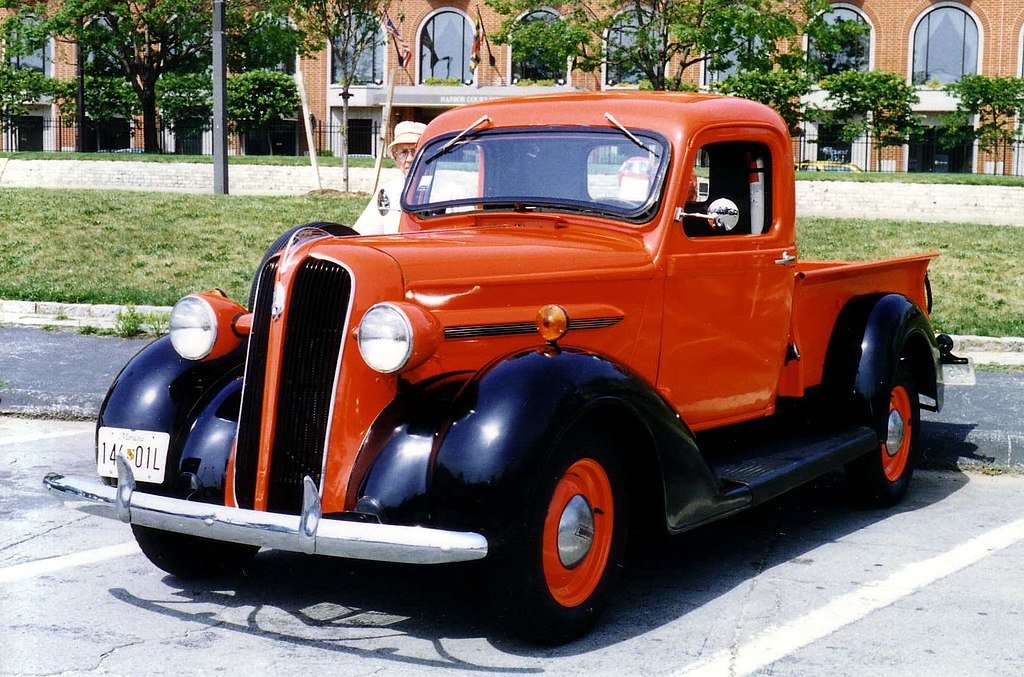11 July 2022
We all know a truck is a large vehicle for hauling cargo, but the word has another, older meaning referring to commerce or dealings. And since that older meaning has a different etymology, we should consider them to be two distinct words.
The sense of truck meaning commerce, dealings, or business is a thirteenth-century borrowing from the Anglo-Norman *truker or *troker. (Truck is not attested to in that language until c.1400 but is likely older.) The earliest appearance of the word in English comes in a c.1230 manual for female hermits or anchoresses known as the Ancrene Riwle or Ancrene Wisse:
Seint Gregorie awundreð him, & seið þet men beoð wode þet trochieð swa uuele: “Magna uerecundia est grandia agere & laudibus inhiare: vnde celum mereri potuit, minimum transitorii favoris quærit.”
(Saint Gregory, himself, marvels, and says that men are of unsound mind who truck such evil: “It is a great shame for an adult to solicit and desire praise: when they are able to win heaven, to seek cheap, transitory favor.”)
Truck in the sense of goods to be traded appears by 1555 in a translation of Pietro Martire d’Angheira’s The Decades of the Newe Worlde:
But the Tartars that inhabite the midland or inner regions, bringe none other wares then truckes or droues of swift[e?] runnynge horses and clokes made of whyte feltes: also hales or tentes to withstonde thiniuries of coulde and rayne.
By the early seventeenth century truck had generalized to mean commercial trade. And in late eighteenth century America, the word took on the sense market produce, such as that produced on a small farm. From an advertisement in the 14 December 1784 Maryland Journal and Baltimore Advertiser:
He has also provided a large Room, with a Stove, for his Customers to lodge in, and deposit their Market-Truck with a Lock and Key thereto.
Hence, we get truck farm, which is not a farm that loads its produce onto trucks—although it may do that—but rather one that produces crops for sale in the local market.
The vehicle sense of truck, on the other hand, has a very different etymology. It is a borrowing from the Latin trochus (metal hoop), which in turn is from the Greek τροχός (wheel). References to trocleis or trokles, referring to pulleys, are found in various account books as far back as the late fourteenth century. And an early fifteenth-century translation of Vegetius’s De re militari (Regarding Military Affairs) has this:
The plute is a gyn of defence made like to þe side of an hous, wiþ a grounsel [...] and in þe groundsell þre trokeles or wheles to renne vpon.
(The plute is an engine of defense made like the side of a house, with a foundational frame […] and in the frame three trockles or wheels to run upon.)
From there truck took on the meaning of a variety of types of wheeled devices, especially those that moved or transported loads, such as wheelbarrows or dollies. And by the early twentieth century the word was being applied to motor vehicles used for that purpose. The following appeared in British Columbia’s Daily Colonist on 2 July 1916:
The product of the rubber trees of the tropics is as vitally a contraband of war as gunpowder, steel, copper, dynamite or nitric acid, for the iron-shod war horse of former days has evolved into the padded wheel motor car, motor truck and motor cycle of 1916.
So that’s it. Two distinct but easily conflated words.
Sources:
American Heritage Dictionary, fifth edition, s.v. truck.
Angheira, Pietro Martire d’. The Decades of the Newe Worlde. Richard Eden, trans. London: William Powell for Edward Sutton, 1555, sig. BBBb.ii.r. Early English Books Online (EEBO).
Anglo-Norman Dictionary, 1992, s.v. truck.
“A Market-Yard and Lodging Room” (advertisement). Maryland Journal and Baltimore Advertiser, 14 December 1784, 3. Readex: America’s Historical Newspapers.
Morton, James. The Ancren Riwle. London: Camden Society, 1853, 146. HathiTrust Digital Archive.
Merriam-Webster.com, 2022, s.v. truck.
Middle English Dictionary, 2019, s.v. truken, v.(1), trokel, n.
Oxford English Dictionary, second edition, 1989, s.v. truck, n.1, truck, n.2, truck, v.1, truck, v.2, truckle, n.
“Rubber Trade is Sixty Years Old.” The Daily Colonist (Victoria, British Columbia), 2 July 1916, 15.
Photo credit: Christopher Ziemnowicz, 1999. Public domain image.

